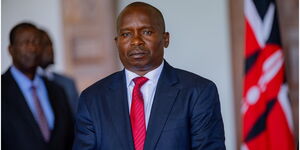The Social Health Insurance Fund Chairperson, Timothy Olweny on Wednesday, explained that the government would assess and verify Kenyans' eligibility for free SHIF care.
According to the SHIF Act, Kenyans who are not able to cater for the mandatory Ksh300 monthly payment are eligible for a waiver of the fees and free treatment.
Olweny confirmed that the government will conduct lifestyle audits for Kenyans to ensure that cases taken on for the waiver are legitimate cases.
Speaking during an interview with KBC, the chair emphasised that the audits will be carried using a scientifically developed tool referred to as the Means Testing Instrument.
“The Means Testing Instrument looks for indirect ways of being able to gather information and estimate what your worth is and then we peg the 2.75 per cent of the income as what you are expected to pay”, Olweny clarified.
He emphasised that the assessments and scientific testing instruments are expected to deter any unscrupulous individuals who would try to evade payments.
The statement was backed up by Kerama Onyimbo, the Deputy Director of Clinical Services at the Kenyatta University Teaching and Research and Referral Hospital (KUTRRH).
He stated that the government would utilise health social workers to visit homes and conduct assessments for applicants of the waiver.
“For us to waive, we have to make sure that we understand who we are dealing with, we’ll send a vehicle to that home with a social worker, Onyimbo noted.
The government intends to incorporate the informal sector through the mandatory payment of the SHIF citing that Ksh 56 billion is expected to be collected from the informal sector.
Olweny, also clarified that the SHIF is different from NHIF as its mandate was split into three: Primary Care, Emergency and Chronic illness, and Social Healthcare.
Further, Onyimbo explained that emergency and chronic illness care would cover the cost of care after the depletion of social healthcare.
SHIF which is expected to replace NHIF to offer healthcare coverage for Kenyans, has been marred with controversy as Kenyans seek clarity on the new system.
On Tuesday, doctors rejected the payment of Ksh200,000 from their income as annual payments to the SHIF stating that the costs were too high even after the government was given the greenlight to implement the Act.












